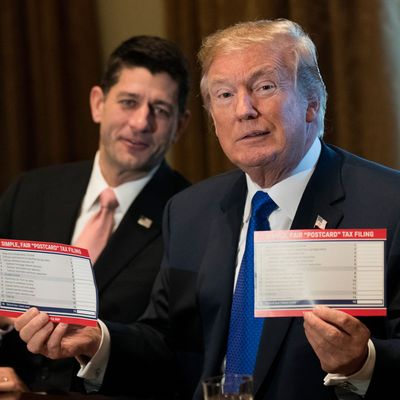
When last November’s elections surprisingly handed them full control of the government, the Republican Party’s leading domestic-policy minds decided they would not squander their power as they had the last time. The tax cuts passed under George W. Bush had suffered from a fatal flaw: The tax cuts expired after a decade, in order to satisfy Senate budget rules. This time, they would leave an imprint upon the tax code that would not be washed away.
Unless they wanted to win Democratic support and get 60 votes — a method they never seriously considered — Republicans would have to find a way to offset the cost of their tax cuts, pairing every dollar of tax cuts with a dollar of increased revenue. Republicans believed not only that they could do so, but that they must. George Callas, the chief tax counsel to House Speaker Paul Ryan, expressed this view at a panel in April with admirable bluntness. “You have to come to the realization that there are tough choices that have to be made and you cannot escape those tough choices,” he said. “If you have permanent tax reform that is fully offset with base broadening forever, you’re fine. You don’t have to have anything sunset under the reconciliation rules. You can have permanent tax cuts that are paid for in the out years.”
Ryan had ideas for how he would pay for the tax cuts he and his party craved. They would establish a border adjustment tax to replace the corporate income tax. They would eliminate the federal tax deduction for state and local taxes. It would all add up, and the result would be a monument to Ryan’s grand vision of libertarian purity. Simple, clean, much less progressive.
They have delivered on their goal of a tax code that allows wealthy people to pay lower rates. The corporate income tax would be slashed, the estate tax (a levy on inheritances above $11 million per couple) and the alternative minimum tax (which prevents the very rich from escaping taxation) would be repealed, and business owners would get a lower “pass-through” rate. But they have not introduced much simplicity to the tax code (and, indeed, some of their changes add even more complexity).
More to the point, they have not found anywhere near enough added revenue to offset the costs of their cuts. The House plan will reduce revenue by $1.5 trillion in its first decade. It may reduce revenue by even more in the second decade. At the very least, it will not come anywhere close to revenue neutrality.
This problem will not prevent it from passing the House. The obstacle comes in the Senate, where the party’s 50-vote threshold will become insuperable. Republicans in the upper chamber will need to come up with about a trillion-and-a-half dollars in budget savings.
And coming up with plans to make people pay more to the government is, of course, the hard part. The only politically tenable way to do this that anybody has devised in a generation is to make rich people pay more. (There aren’t very many of them, and they have a lot of money.) But Republicans are loathe to do so — indeed, their goal is precisely the opposite.
Reports circulated Wednesday evening that Republicans would sunset the corporate tax cuts after a decade. They decided at the last minute not to do so. But they didn’t settle on a different solution to the no-deficits-after-ten-years barrier. The months they have spent trying to maneuver around Senate rules and avoid the mistake of the Bush years have come up mostly empty. They are going to leave it to the Senate to devise an answer to a problem they could not solve. In its most important aspect, then, the House tax-cut plan is a complete failure of governing.






























